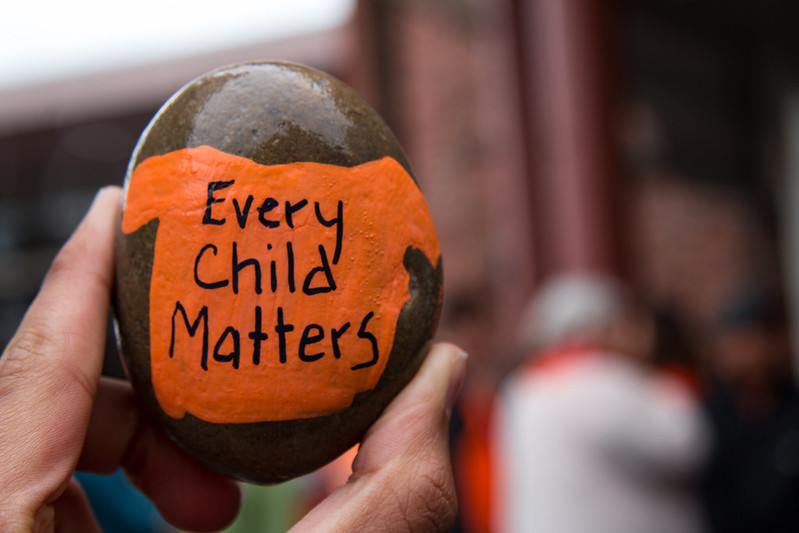Tomorrow, September 30th, is a statutory holiday in Canada called the National Day for Truth and Reconciliation.
This holiday is meant as a day of reflection on Canada’s colonization of its indigenous peoples and the devastating impact of the Indian residential school program on indigenous families and culture.
For over 100 years these programs “assimilated” indigenous people by brutally re-educating indigenous children. Like similar programs in the United States and Australia, residential schools were charged by the government with “civilizing” indigenous people through religious education, often forcibly removing them from their homes and placing them in boarding schools. These programs were meant to obliterate any awareness or practice of indigenous culture, spirituality, and language. The methods used at many of these schools were criminally abusive and often deadly.
The last of the residential schools was closed in 1997, but revelations about their horrors are ongoing. Though the Truth and Reconciliation Commission of Canada was founded in 2008 to investigate their abuses, the government bill establishing the holiday was only passed by Parliament in 2021, shortly after the the discovery of the remains of 215 children on the grounds of the former Kamloops Indian Residential School.
September 30th was chosen as the date of commemoration because it corresponds with Orange Shirt Day, a movement started in 2013 by the survivors of the residential school system to raise awareness of its devastating impact. Their rallying cry of “Every Child Matters” brings attention not only to the victims and survivors of residential schools, but to the intergenerational trauma and continuing violence against indigenous peoples today.
The need for healing is profound and ongoing, but much of Canada is still deaf to indigenous pleas for acknowledgement. Even the Pope’s apologia for the Church’s part in the residential school program may have caused more pain than peace. Everyone needs to do better. Will a “national day of truth and reconciliation” help?
There’s too much to recount in this short blog post, but if you’re interested in anti-racism I encourage you to find out more. As a quick primer I recommend this brief video about the origins of Orange Shirt Day narrated by residential school survivor Phyllis Webstad.
I give the Canadian government props for publicly wrestling with its violent colonial past, and for expressing its shame with a public holiday instead of sweeping it under the historical-fiction rug. Compared with the stubborn White racism in the U.S. that re-ignites annually around Columbus Day/Indigenous Peoples Day, it’s at least a step in the right direction.
Whether true reconciliation can ever be achieved after systemic genocide remains to be seen, but it seems at least in Canada the door is open.
Of course, here in Quebec, Legault’s not very keen on honoring this holiday. His Bill 96 (the English language bill) heavily impacts indigenous people in the province who are still struggling to keep their own languages and cultures alive. Québec’s provincial election day rapidly approaches and, unsurprisingly, indigenous issues don’t seem to be on any of the QC candidate’s radar. This predictably cold shoulder towards other cultures may be part of why most of the ROC isn’t so fond of Québec.

